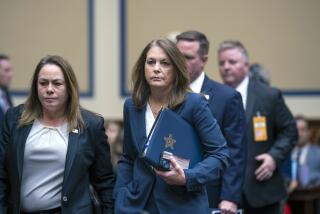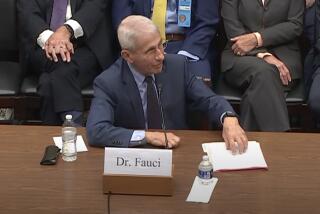THE IRAN--CONTRA HEARINGS : Committees Fail to Get Specific Answers to Host of Key Questions
WASHINGTON — “I think you will agree that we have had enough questions,” Senate Iran- contra committee Chairman Daniel K. Inouye (D-Hawaii) told Lt. Col. Oliver L. North near the end of North’s marathon testimony on Wednesday.
North nodded.
Yet in focusing on broad questions of policy-making and legal principle, the committee--for all its six days of give and take--failed to elicit specific answers to a host of potentially crucial questions about the scandal.
In their single shot at querying North under oath, for example, House and Senate interrogators elected not to probe in detail North’s knowledge about the actions of top officials such as former White House Chief of Staff Donald T. Regan, Vice President George Bush and Atty. Gen. Edwin Meese III.
Quashed Probe Not Examined
Nor did they probe beneath the surface into reports, bolstered by North’s own notes, that North urged Meese and others to quash FBI, Customs Service and Federal Aviation Administration probes of Southern Air Transport, the shadowy airline used in the Iran arms sales and the secret arms airlift to Nicaragua rebels.
And they did not ask North about the CIA’s unusual decision last September to buy $2.1 million in smuggled weapons from North’s three closest associates in the scandal, Albert A. Hakim, Thomas C. Clines and Richard V. Secord. The three men pocketed $861,000 in “commissions” from the sale.
The missed questions recalled earlier observations about the committees’ failure to ask key questions of North’s former boss, National Security Adviser Robert C. McFarlane, when McFarlane testified at the hearings’ first days last May. McFarlane returned briefly to the witness table Wednesday.
“They could’ve been a little bit in disarray” in the face of North’s strong performance as a witness, a defense lawyer for one low-level figure in the Iran scandal said Wednesday of the congressional interrogators.
“Every time they had a question for North, he clobbered ‘em. And every time that happens, whether it’s in a hearing room or a courtroom, you start to get a little gun-shy. I’m sure that happened to them.”
Beyond this, some other legal experts suggest that the panel was hamstrung from the start by an agreement between the committees and North’s lawyer, Brendan V. Sullivan Jr. The pact prevented lawyers from interviewing North in detail before his public testimony and placed at least some restraints on the number of hours that North would be interrogated under oath.
“In a public hearing, you only want to ask questions where you’re reasonably sure of the answers. You want to focus on the points of vulnerability,” said Washington attorney Philip A. Lacovara, who was counsel to Watergate special prosecutor Archibald Cox and some of Cox’s successors.
In contrast to most congressional hearings, Lacovara noted, the lawyers for the Iran-contra panels seldom knew in advance what North was likely to say and so were not always certain where their questions would lead.
Lacovara and others gave high marks to Senate majority counsel Arthur L. Liman and House majority counsel John W. Nields Jr., who did most of the interrogation during North’s appearance.
Gives Poindexter Advantage
A quick review of the testimony nevertheless turns up gaps in the committees’ lines of inquiry. Failure to pin North down is especially crucial because it leaves the next key witness, former National Security Adviser John M. Poindexter, in the position of being the sole authority on central issues.
In North’s case, as in McFarlane’s, the committees appear to have passed over any detailed inquiry into which White House intimates besides the President and deceased CIA Director William J. Casey knew what was going on.
Regan, named in November, 1986, news reports as a potential key figure in the scandal, was barely mentioned in North’s six days of testimony. Regan has vigorously denied any knowledge of potentially illegal acts.
The most vigorous interrogation about presidential hopeful George Bush’s role in the Iran-contra affair consumed about two minutes of Nields’ questioning time in the second day of the hearings:
“How about the Vice President?” Nields asked. “Was he aware of your role in the contra resupply operation?”
“If he was, I didn’t tell him,” said North, answering neither “yes” nor “no.”
“How about people in his office?”
“Well, I don’t know . . .” North replied. He then said he had spoken briefly to Bush’s national security adviser, Donald P. Gregg, about an associate who had proven a thorn in the side of North’s contra arms network.
The associate, Felix Rodriguez, held several meetings with Gregg and a second Bush aide as the contra resupply network unravelled last year, but the matter was not pursued.
Asked why the roles of higher-ups were not pursued with North, the former U.S. attorney for the District of Columbia, Charles F. C. Ruff, said: “That’s a good question. Whether they knew something from their limited in camera discussions with North and just wrote it off, or had some other reason, I don’t know. But in what I saw, there was very little effort to explore people’s personal knowledge beyond the President and Casey.”
A third intimate of both the President and Casey, Atty. Gen. Meese, received somewhat closer scrutiny from panel members for his roles in approving a hostage-ransom effort, in helping draft a chronology of the Iran affair that later was shown to be falsified, and in helping to prepare a presidential finding legalizing the secret sale of weapons to Iran.
Testimony by Operative
But North was not questioned about testimony by one of his operatives, retired Air Force Col. Robert C. Dutton, who said North had shut down Customs Service and FAA probes of Southern Air Transport last October, shortly after a contra resupply plane was shot down over Nicaragua.
Dutton testified that North told him Meese would take care of the probes, which were interrupted not much later.
North volunteered to Rep. Peter W. Rodino Jr. (D-N.J.), that he had asked Meese to delay an FBI inquiry into Southern Air in October, 1986, as has been previously reported. He said the delay was requested so that Southern Air’s role in the Iran arms-for-hostage talks would not be disclosed.
Financial Issue Not Followed
In public at least, interrogators also danced around a potentially important financial issue raised by the CIA’s weapons purchase: whether the CIA was pressured by the White House to “bail out” Secord, Hakim and Clines from an expensive arms-smuggling deal gone awry.
The CIA paid the three men $1.2 million last October for a boatload of weapons once meant for the contras. Agency officials have maintained that they did not know the weapons came from North’s associates.
North was shown computer messages last week that may bear on the questionable arms deal, but he declined to answer questions until he had read declassified versions. Whether he was queried about the deal in an executive session of the congressional panels is not known.
More to Read
Get the L.A. Times Politics newsletter
Deeply reported insights into legislation, politics and policy from Sacramento, Washington and beyond. In your inbox three times per week.
You may occasionally receive promotional content from the Los Angeles Times.










